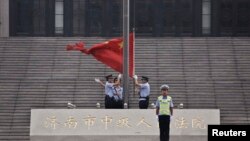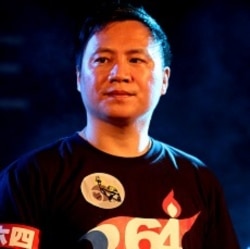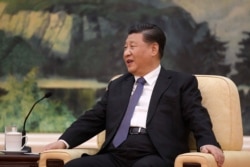Chinese property tycoon Ren Zhiqiang, who went missing last month after criticizing top leader Xi Jinping for what he said was the government’s mishandling of the coronavirus outbreak, is being investigated by the Communist Party’s disciplinary watchdog.
In a statement released late Tuesday, the party’s Commission for Discipline Inspection in Beijing’s Xicheng district announced that Ren – a party member and a former top executive of state-controlled property developer Huayuan Real Estate Group – is under investigation for what it called “serious violations of law and discipline.”
The statement gave no further details.
Analysts argue, the investigation is meant to send a clear message that any challenge to Xi’s authority will not be tolerated. They say it also indicates the top leadership's division and unease about growing domestic and international calls for holding the Communist leadership accountable for the global pandemic.
“The message is pretty scary because clearly the Chinese Communist Party wants to silence everyone, any critical voice about the way the government has managed the coronavirus crisis,” said Jean-Pierre Cabestan, political science professor at the Baptist University of Hong Kong.
“Xi cannot afford having his grip over the country openly questioned, which may generate a buildup of dissonance within the party,” said Kenneth Chan, another political scientist at the university.
Wang Dan, former Tiananmen protest student leader, agreed that China's message — Xi’s authority is not to be challenged — is clear.
But he said the fact that Ren’s case is being handled by the city-level political and legal affairs commission shows Xi’s attempts to downplay it.
“Xi dares not go to lengths to deal with Ren, which reflects that his [Xi’s] authority was indeed challenged,” Wang told VOA in an emailed reply.
Beijing has been criticized for initially downplaying the severity of the coronavirus outbreak. Government data indicates the virus, which originated in Wuhan province, now appears to be subsiding in China. Some experts say Beijing’s move to lock down areas where the virus was widespread may have contributed to its decline.
An Outspoken Critic
In a scathing essay, Ren called Xi Jinping “a clown” in his handling of the Coronavirus outbreak.
Ren referred to a teleconferenced address made by Xi on 23 February to party officials nationwide. State media used the teleconference to showcase Xi as a capable leader battling the epidemic on the front line while public anger simmered at the initial government cover-up.
Ren, who refrained from naming Xi, wrote that after reading the speech, he “saw not an emperor standing there exhibiting his ‘new clothes’, but a clown stripped naked who insisted on continuing being emperor,” according to a translated version posted by China Digital Times, a US-based website.
He blamed the initial spread of the disease on the lack of free speech, citing the police detention of Dr Li Wenliang and other medical professionals who warned friends against the mysterious virus in January for spreading “rumor.”
“Maybe simply trusting the people with freedom of speech could have already achieved a great victory in preventing and managing this epidemic, and there wouldn’t be such a huge price to pay!” Ren wrote in the essay that was initially shared with a few people he knew, but later distributed widely.
“Without a media representing the interests of the people by publishing the actual facts, the people’s lives are being ravaged by both the virus and the major illness of the system,” he charged.
Calls for Xi’s Resignation
Already, an open petition, led by Wang, has garnered endorsement from more than 20 dissidents overseas to call for Xi’s resignation over his responsibility in mishandling the outbreak.
The petitioners have proposed four other demands including the creation of an independent investigation to uncover truth about the pandemic and hold officials accountable, a relief fund for victims, a mechanism to safeguard speech freedom and an end to China’s “whitewashing” global propaganda campaign.






